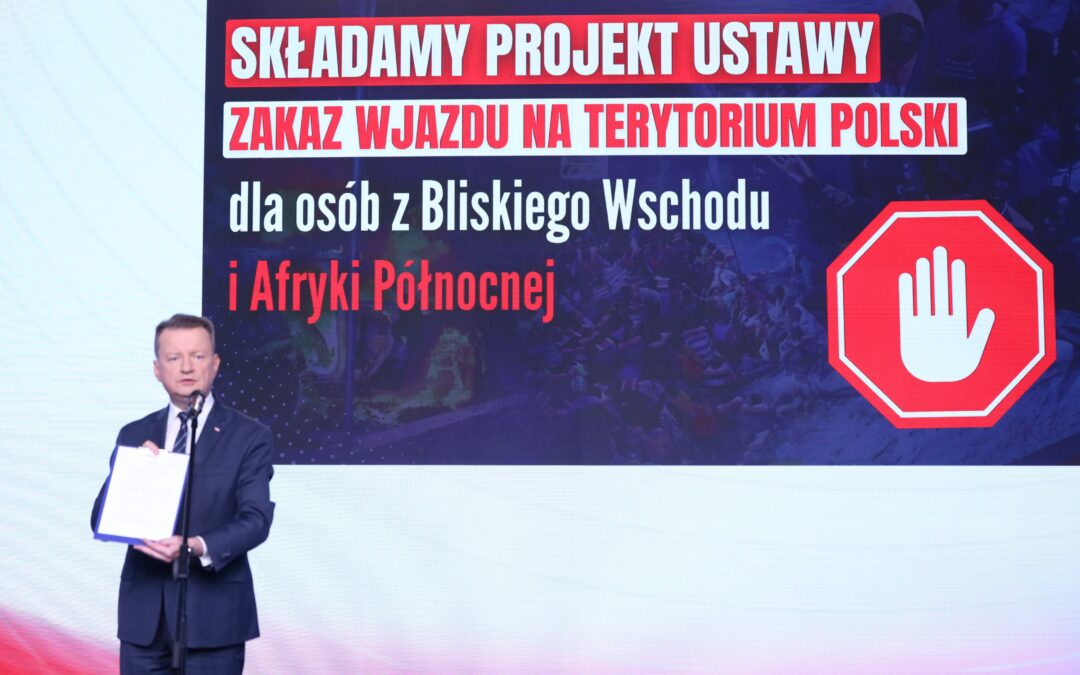Keep our news free from ads and paywalls by making a donation to support our work!

Notes from Poland is run by a small editorial team and is published by an independent, non-profit foundation that is funded through donations from our readers. We cannot do what we do without your support.
Poland’s main opposition party, the national-conservative Law and Justice (PiS), has proposed an entry ban for people from certain countries in the Middle East and Africa. It says this would help stop Germany’s practice of sending migrants who have illegally crossed the border back to Poland.
The proposal comes amid renewed debate over how to tackle migration, with the Polish government on Tuesday announcing the reintroduction of controls on Poland’s borders with Germany and Lithuania in an effort to prevent the “uncontrolled flow of migrants”.
Poland is reintroducing controls on its borders with Germany and Lithuania to prevent the “uncontrolled flow of migrants”, in particular those returned by Germany after entering illegally
"Poland’s patience is running out," says Prime Minister @donaldtusk https://t.co/Pttd3FvpHA
— Notes from Poland 🇵🇱 (@notesfrompoland) July 1, 2025
After Prime Minister Donald Tusk had announced the border controls, the head of PiS’s parliamentary caucus, Mariusz Błaszczak, said that the government’s actions were “too little, too late”.
“This crisis has been going on for months,” he continued. “This issue requires far-reaching action.”
Błaszczak said that PiS would submit a bill to parliament introducing a temporary ban on entry to Poland for third-country nationals from “specific countries outside Europe…whose citizens illegally cross borders”.
Previously, on Monday, PiS party leader Jarosław Kaczyński had called for an “immediate ban on entry to the territory of Poland for people from the Middle East and North Africa”.
🇵🇱 Bezpieczeństwo naszych obywateli jest najważniejsze! pic.twitter.com/d563hBnWZN
— Prawo i Sprawiedliwość (@pisorgpl) July 1, 2025
PiS has not yet specified which Middle Eastern and African countries would be included in its proposed ban. It says they would be selected based on analysis of data showing which nationalities most often cross borders illegally or are transferred to Poland from Germany.
A government information campaign discouraging people from trying to illegally enter Poland was recently launched in Afghanistan, Ethiopia, Eritrea, Somalia, Iraq, Pakistan and Egypt, countries from which Poland has identified the largest numbers of people crossing the border from Belarus.
Since 2021, tens of thousands of migrants and asylum seekers – mainly from Asia and Africa – have tried to enter Poland from Belarus, with the encouragement and assistance of the Belarusian authorities.
In response, Poland has heavily fortified its eastern border with physical barriers and electronic monitoring. The government also recently banned asylum claims by people crossing from Belarus. Those measures have led to a dramatic decline in the numbers entering via that route.
In his remarks on Tuesday, Błaszczak made clear, however, that PiS’s proposed entry ban was designed to address the issue that has recently caused most controversy, which is Germany’s policy of sending back to Poland thousands of migrants who crossed the Polish-German border illegally.
Many of those sent back are Ukrainians. Others are non-Europeans, often from Asia and Africa, who have either claimed asylum in Poland – and therefore must remain there while their applications are processed – or have simply passed through it after entering the EU irregularly.
“After the introduction of this [proposed] law, Polish border guards will be able to prevent citizens of these countries from entering our territory,” said Błaszczak. “So those who are today being transferred from Germany by the German authorities, or who are trying to cross from Germany to the Polish side, will not be able to do so.”
The migrant returns carried out by Germany take place under a combination of EU regulations, bilateral agreements with Poland, and the border controls that Berlin reintroduced in 2023. Earlier this year, Tusk declared that Poland may stop adhering to such agreements.
Official data show that, in the space of 14 months, Germany has returned to Poland over 11,000 migrants who unlawfully crossed the Polish-German border
The issue of such returns has become a hot topic during Poland's ongoing presidential election campaign https://t.co/RSXxg03JWZ
— Notes from Poland 🇵🇱 (@notesfrompoland) April 11, 2025
However, some Poles have sought to take matters into their own hands, organising self-declared “citizen patrols” – some of them hundreds strong – at the German border to monitor and prevent migrant returns.
Błaszczak said that PiS politicians will be visiting the German border to make clear that “we support the border defence movement”, which he described as “Polish patriots who took matters into their own hands when Donald Tusk’s state abdicated [its responsibilities]”.
He also pledged that the party “will provide support to those who are persecuted by the current authorities of our country” for undertaking such actions, reports the Polish Press Agency (PAP).
Earlier this week, Tusk and interior minister Tomasz Siemoniak criticised the actions of the citizen patrols, saying that they are disrupting the work of border officers and spreading false claims about the number and types of migrants being transferred by Germany.
The Polish government has criticised the actions of self-proclaimed “citizen patrols” that have gathered on the German border to prevent the return of migrants to Poland.
PM @donaldtusk accused "ultra-right politicians of putting on a show at the border" https://t.co/SuB4o9XGbD
— Notes from Poland 🇵🇱 (@notesfrompoland) July 1, 2025

Notes from Poland is run by a small editorial team and published by an independent, non-profit foundation that is funded through donations from our readers. We cannot do what we do without your support.
Main image credit: PiS/X

Daniel Tilles is editor-in-chief of Notes from Poland. He has written on Polish affairs for a wide range of publications, including Foreign Policy, POLITICO Europe, EUobserver and Dziennik Gazeta Prawna.



















